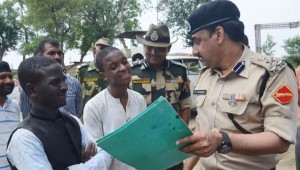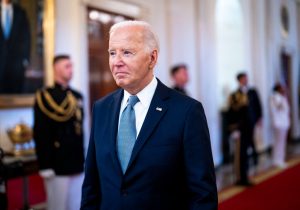Tow Nigerians ‘On Their Way To Iraq’ Arrested In India

Border security detains Nigerians for questioning. Photo Credit: hindustantimes.com

A huge drama was witnessed near the integrated checkpost (ICP) at Attari on the border between India and Pakistan when two Nigerian students from Delhi scaled a 20-foot-high grilled fence in a bid to illegally enter Pakistan in the morning of Friday, August 7.
The two Nigerians, who claimed to be cousins, were identified as Imran Kabir, 24, and Jamilu Sani, 25 years of age. They were arrested by Border Security Force (BSF) personnel after a chase.
“Both wanted to go to Pakistan for pursuing Islamic studies. Sani had a Nigerian passport, while Kabir didn’t. We recovered five printouts taken from Google maps of Pakistan, Afghanistan and Iraq. They described Iraq as their final destination,” a BSF spokesperson said.
The duo got to the checkpoint at about 5.50am in a stolen Swift Dzire taxi. The BSF said they had hired the taxi from Delhi and made off with it on reaching Amritsar when the driver, with whom they had had a disagreement on Thursday night over the fare, was asleep.
They parked the car close to the border and enquired about the route to Pakistan. They were told that the border was closed at that time, but rather than leaving, they waited near the car.
The BSF personnel, who are ever on high alert, became suspicious and approached them. The two Nigerians panicked and sped away on the road.
The border guards chased them, forcing the suspects to abandon the car. The duo managed to climb over a 20-foot-high grilled fence and jump onto a rail track.
“Once there, they thought they had entered Pakistani territory and started shouting ‘we are in Pakistan’. They didn’t know that they were still in India,” the BSF spokesperson said.
During interrogation one of the Nigerians claimed to be a student of Mahatma Gandhi Open University in Delhi and the other said he studied at Karnataka State Open University, also in Delhi.
“Both had come to India on student visa in 2014. They said they were headed for Afghanistan en route to Iraq, which was their final destination. They wanted to pursue Islamic studies in Pakistan before that,” the Indian authorities confirmed.
There were suggestions that the men had been trying to join ISIS. When searched, a copy of the Quran, mobile phones, and the sum of 4,000 Naira was recovered from them. However, no weapons were found.
The suspects will be handed over to the police after initial interrogations.
About four months ago, Nigeria’s deadly terrorist group, Boko Haram, pledged its allegiance to the Islamic State of Iraq and Syria.
Boko Haram appeared to have aligned its media production, social media and execution style videos with ISIS.
Some say the vow of alliance by the Nigerian terror sect to the Islamic State may be no more than a propaganda move.
Earlier this week, the militants put out a video that showed the beheading of a policeman. The method of the killings, and also the professional production values of the recording, reflected the work of the so-called Islamic State. Some experts fear that it could presage tighter links.
Peter Pham, director of the Africa programme at the Atlantic council think tank in Washington, said: “It’s something that has been developing over the course of at least nine months.
“Both groups need this right now. They need a propaganda coup to raise morale and attention because they are both suffering setbacks in their military campaigns.
“For Isis, it’s an opportunity to present themselves as ever-expanding, to enhance their aura of inevitability. It’s a propaganda victory. And for that, all you need is a small camera and an Internet connection.”
However, reports by NBC News states that American Intelligence officials believe racism will stop ISIS operating in Northern Africa and from teaming up with the Boko Haram sect.
“The Arab world is incredibly racist. They don’t see black Africans as equivalent to them,” a US intelligence official explained.
The official added that ISIS may show “affinity” with Nigeria’s insurgents, “but they stop short of allegiance.”
![]()





